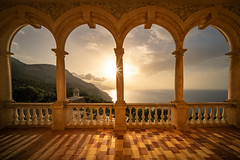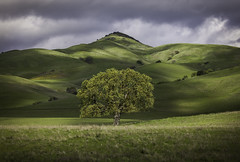At first glance, Belfast seems like a charming, thriving city. Buses run between shops and museums and a university that looks more like a castle. Centuries-old cathedral mingle with modern architecture to the point that one old church has a shiny metal spire instead of a steeple. The city is populated by some of the friendliest people you’d ever want to meet.
But there’s more to Belfast than the streets everyone wants you to see.
Off the wide-paved path is a maze of fences, walls, and barbed wire, raised high and covered in propaganda paint. Churches hide behind metal barriers, children are cared for within the safety of cages, and neighbors are forced apart by the Great Wall of Belfast, the Peace Line. The Barest Tolerance line might be a better name for this wall four times taller than I am; as ex-IRA man Tommy McKearney said, “If they took down the wall tomorrow, it’d be mayhem.”

Each bar, each spike, each splotch of paint is a reminder of the fear and hatred in which this country has marinated for decades, slowly boiling its people alive. So many lives have been lost over slogans like “Our cause will always be maintained: no surrender.” And because neither side has surrendered in the unspoken war, the mural memorials of the sacrificed victims spread across the neighborhoods of Belfast. And although “peace” has brought an “end” to the Troubles, the old barriers, on the streets and in the mind, still divide Unionists from Republicans and British from Irish.

This city is broken, and it mars the beauty of the land and of the Irish people. This is Ireland, the land of saints and scholars, the rolling hills and misty shores. She shouldn’t be covered in metal shards and shrapnel, ripping the earth asunder, trapping the world’s most beautiful people in cycles of prejudice, violence, and misunderstanding, like a coil of the lethal wire spiraling along the borderlines. Her children should be allowed to play together without fear of stoning or brainwashing in hate.

For a conflict which purports to have begun over religion, the people involved don’t seem to consider their faith before they act. Protestants who spout “Fear God, honor the King,” quickly gloss over “love the brotherhood.” Catholics who pray, “Our Father who art in heaven,” forget the line that goes, “Forgive us our trespasses as we also forgive those who trespass against us.” A painting on the Peace Line sports a cross that says, “New Life.” If there’s one thing Belfast needs, it’s a breath of new life.
But considering the Celtic reputation for stubbornness, that breath could be held for quite some time.








I love this! That’s the kicker about sectarian conflicts: it quickly becomes not about religion at all, and God becomes a piece of political propaganda. By tunneling your focus on religion, you completely forget about what religion means.